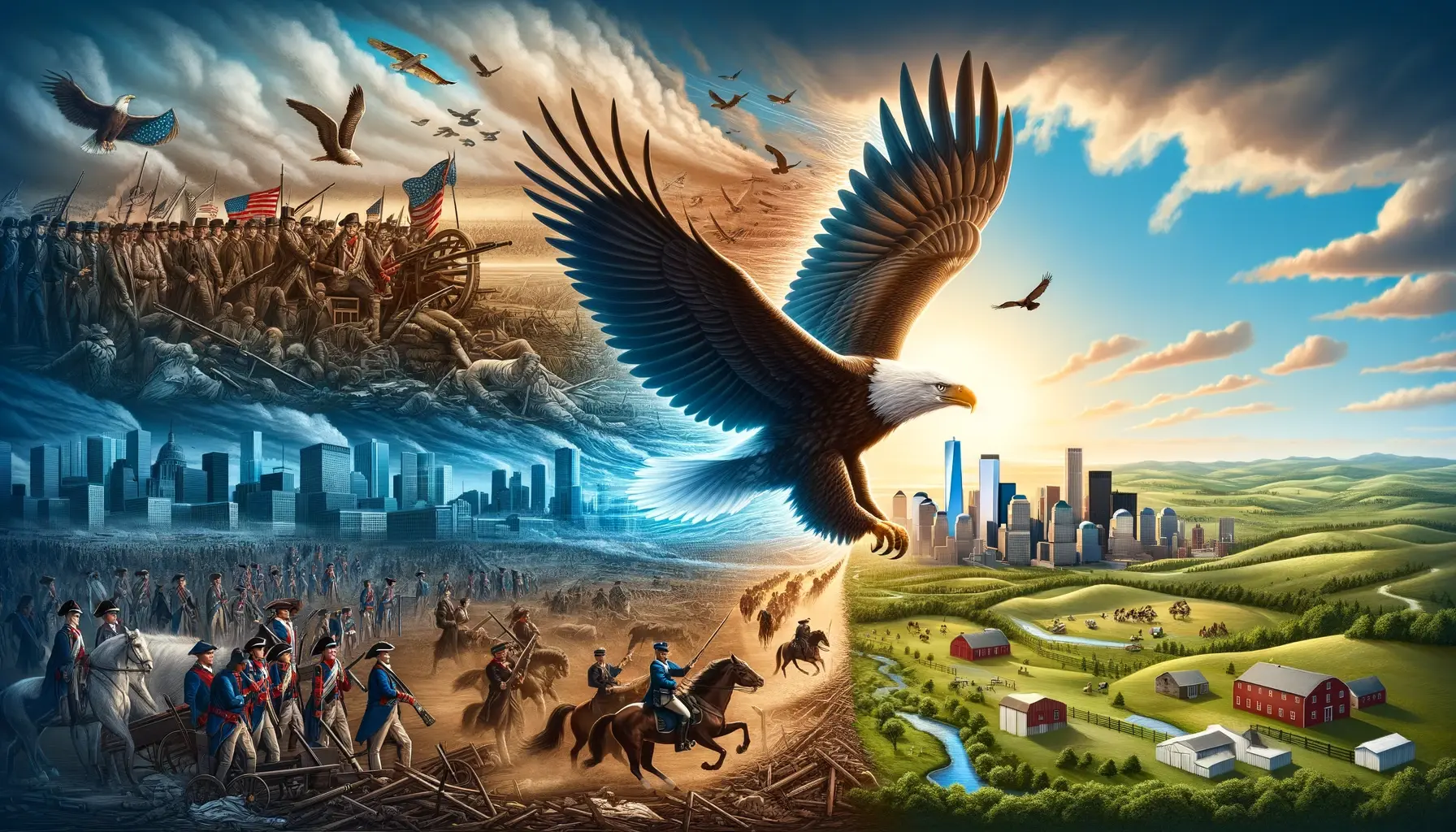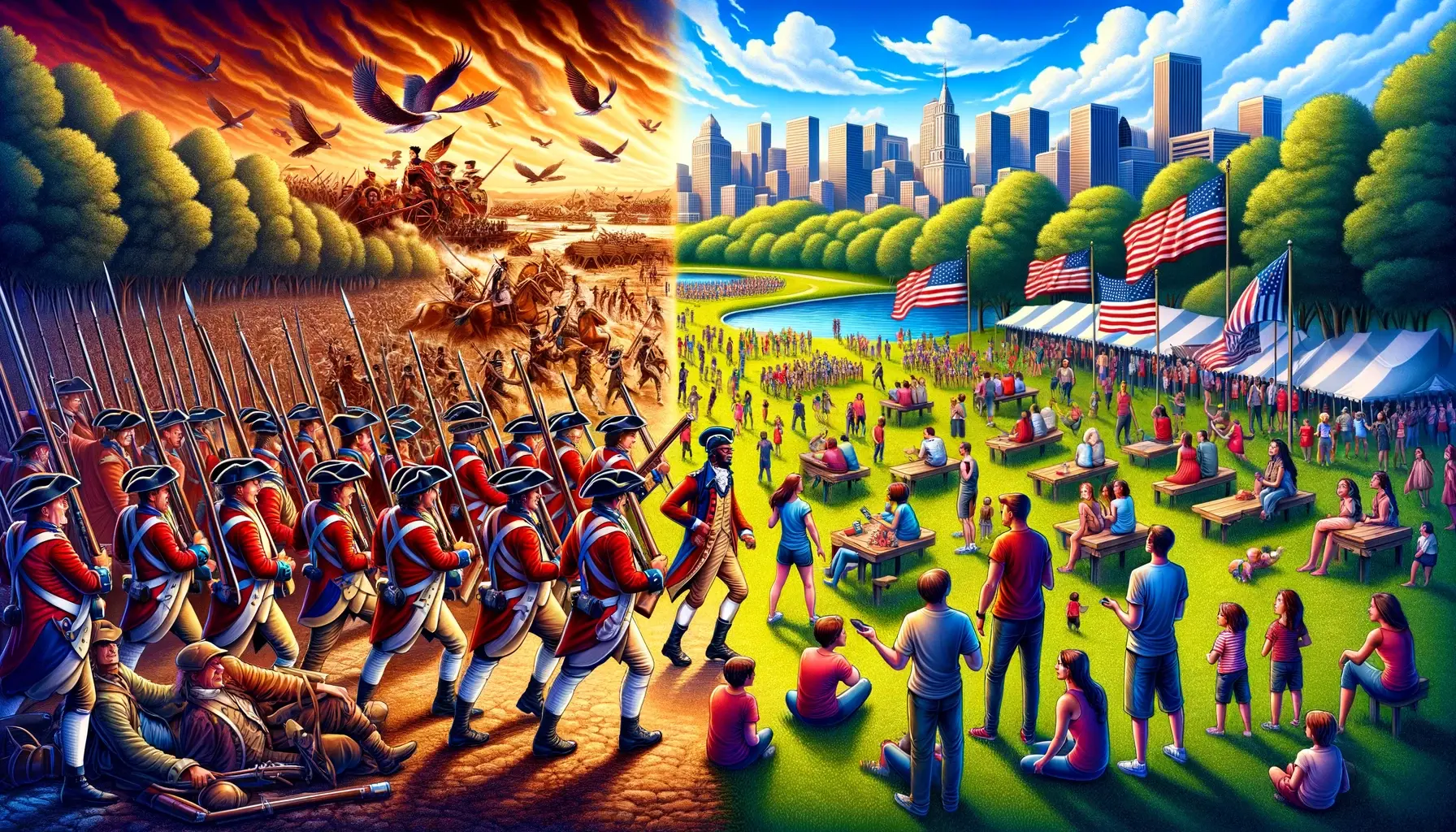As we probe the annals of American history, seeking the essence that has fueled its journey, we often return to the hallowed year of 1776—a time when the drumbeats of revolution set forth the cadence for a new nation's heart. But what of the intrepid spirit that spurred the founding patriots to action? Does it still course through the veins of 21st-century America? "Modern Patriotism: Echoes of 1776 in 21st Century America" ventures beyond the surface to unravel how the pulsating spirit of independence, unity, and resolve—the lifeblood of a fledgling republic—continues to reverberate within the framework of our modern age. Join us on a quest that will traverse from the Bastions of Revolutionary fervor to the citadels of contemporary civic life, exploring the enduring legacy of America's forefathers and examining whether their visions of liberty and democracy still hold the banner high in the hands of today’s patriots.
Revisiting the Spirit of 1776
The Roots of American Patriotism:
When we ponder the origins of American patriotism, our minds are cast back to that seminal year of 1776, an epoch where the clamor for independence and the pursuit of freedom became the rallying cry for an entire nation in the making. It was in this crucible of dissent and hope that the concept of modern patriotism found its first utterance. The founding fathers ignited an insurrection not merely against a colonial power, but against the very idea of despotic rule, instilling timeless values—liberty, self-governance, and the quest for the common good—into the newborn fabric of the United States. Today, as we navigate the complexities of the 21st century, these principles continue to resonate with an unbroken fervor, binding us to our forebearers in an unyielding bond. The reflection of revolutionary ideals in modern America is not just a nod to our past; it's the beacon guiding our national character.
Transitioning Ideals:
The ideals kindled in 1776 have not remained static; they have evolved, morphed, and adapted to fit the contours of an America that looks markedly different from the days of muskets and parchment. In our modern tapestry, patriotism weaves itself through a complex interplay of democratic principles, Constitutional rights, and social cohesion, echoing the original aspirations of the revolution. From the reverberations of political activism to the silent, unifying presence of national symbols—the American flag, the Bald Eagle, the Liberty Bell—these symbols serve as waypoints on our journey as a nation. Modern patriotism evokes a sentiment that is at once a preservation of a legacy and a renewing spirit, championing the liberties and responsibilities that have come to define American identity.
Modern Challenges:
Yet, the path of contemporary patriotism is fraught with challenges that the drafter of the Declaration of Independence could scarcely have imagined. In an era of political polarization, misinformation threats, and fierce debates over American exceptionalism, the very foundation of our collective sense of self comes under scrutiny. As we grapple with economic disparity and the tensions between globalization and national sovereignty, it becomes imperative to reassess and reinvigorate the patriotic ethos laid down by our revolutionary predecessors. The responsibility falls upon each citizen to engage with these modern issues, armed with historical education, civic engagement, and a vigilant commitment to the ideals that have carried us from the days of 1776 to now. Upholding the revolutionary ideals in a time of such unprecedented change is not merely a nod to our heritage; it is a clarion call to action, bidding us rise once more to the great task of preserving the unbroken chain of American patriotism.
The Principles of 1776 and Contemporary Patriotism
The foundational roots of the United States are deeply intertwined with the concepts of liberty, equality, and the unwavering pursuit of justice—ideals that were crystallized in the year of 1776. Today, these principles remain at the heart of what it means to be an American patriot. Here we examine how these historic ideals are reflected in modern patriotic sentiment and practice.

Defining Patriotism in the American Context
As a multidimensional construct, patriotism in the American context transcends mere allegiance to a nation-state. It embodies a conscious identification with, and commitment to, the core values and ideals upon which the country was founded, including liberty and self-governance, an indomitable spirit of resilience, the pursuit of the common good, and a stringent respect for the rule of law as articulated in the Constitution. This sense of patriotism is more than an inward feeling; it manifests in the valor of military service, the engagement in civic duties, and the continuous drive for political activism to ensure that governmental systems reflect the voice of the people.
Liberty and Self-Governance
The echoes of the American Revolution resonate through the modern ideals of liberty and self-governance. Whereas the cry of "No taxation without representation" galvanized a movement towards independence, today's patriotic imperative involves safeguarding personal freedoms while ensuring that governance remains a function of the people's will. This balance between freedom and governance defines the American democratic experiment and compels modern patriots to be stewards of their own liberties, holding government accountable and demanding transparency through civic engagement and the democratic process.
Unity and the Common Good
The American motto "E pluribus unum," out of many, one, conveys the historical aspiration for unity despite diversity. In contemporary America, patriotism celebrates a tapestry of cultures, beliefs, and backgrounds united by a shared vision for the common good. This principle of unity in diversity has been critical in building social cohesion and signifies the collective efforts of the populace to work towards improving the nation's welfare through community involvement, philanthropy, and a celebration of the cultural heritage that each citizen brings to the American narrative.
Resilience in the Face of Adversity
Historically, American resilience is a hallmark trait exhibited in overcoming the adversities of war, economic depressions, and societal upheavals. The continuous thread from 1776 to today is the courageous resolve of Americans to face challenges head-on, exemplifying social patriotism and the belief that the nation can emerge stronger from its trials. From the bravery displayed by servicemen and women to the unwavering spirit of grassroots movements, American patriotism shines through the determination to preserve the values of freedom and democracy no matter the cost.
The Enduring Role of the Constitution
The United States Constitution stands as a revered document, central to the American patriotic identity. It outlines the framework for government, enshrines the rights of citizens, and empowers the people with the ability to amend it to reflect evolving societal needs—a remarkable example of constitutional patriotism. The reverence for the Constitution unites modern patriots, from staunch defenders of the First and Second Amendment rights to advocates for civil liberties and equality, reinforcing the Constitution's role as both the custodian of American democracy and a living instrument of progressive change.
The Flags of Modern Patriotism
Modern patriotism is not only felt, but also seen---visually heralded by the ageless symbols and daily expressions of national pride that permeate American society. This section explores these palpable flags of patriotism, interpreting how tangible representations of American identity, from the majesty of the national symbols to the dedication of civic involvement, resonate with the echoes of 1776.

Symbols and Their Meanings
Symbols are potent bearers of meaning, carrying legacies and ideologies across generations. No symbol is more evocative of American patriotism than the Stars and Stripes. Its presence, whether softly billowing at a suburban home or gracing the uniforms of the armed forces overseas, constantly reminds us of the unity and courage that form the bedrock of the nation's identity. The Bald Eagle, with its fierce independence, serves as a symbol of the country's freedom and might, while the National Anthem stirs a collective reverence for the sacrifices of those who secured and continue to defend our sovereignty. These symbols are more than mere emblems; they are invocations of the spirit of 1776, perpetuating the American Dream and galvanizing a sense of national pride and vigilance.
Patriotism in Daily Life
Patriotism extends beyond ceremonious displays and into the tangible fabric of everyday American life. In schools, the Pledge of Allegiance and the study of the nation's revolutionary history instill a civic patriotism in young minds, fostering the next generation of informed and engaged citizens. In workplaces and businesses, the spirit of American enterprise reflects the country's unwavering pursuit of innovation and economic opportunity. And in communities, patriotic celebrations like Independence Day and Memorial Day provide moments for introspection on the nation's journey and the ongoing commitment of its people to uphold the ideals of freedom and democracy.
Military Service and Sacrifice
The commitment to military service remains a profound expression of modern patriotism, reflecting core ideals from 1776. Those who don the uniform and pledge to defend the nation carry forward the legacy of the Revolution's militias and Continental Army—the early protectors of America's nascent sovereignty. The respect for veterans and active-duty service members is ingrained in the national consciousness, symbolizing the eternal gratitude for their sacrifice and dedication to protecting the nation's enduring values of liberty and self-governance.
Civic Engagement and Volunteering
Active participation in civic life is a concrete manifestation of modern patriotism. By volunteering, Americans contribute to the common good, aligning with the Revolutionary ethos of a community united for a cause greater than themselves. Civic engagement, from voting to community organizing, embodies the democratic principles of self-governance and political activism. It is through these individual and collective acts that modern patriots actively preserve and nurture the democratic ideals that were fought for in 1776, demonstrating that patriotism is as much about what one does for their country as it is about the pride one takes in it.
Texas Defense Force Security - all-volunteer security
Challenges to Modern Patriotism
While the patriotic symbols and deeds prominently display the nation's heritage and values, contemporary America faces challenges that test the resilience and adaptability of its patriotism. This section delves into the modern trials that may strain the sense of unity and dedication to American ideals, as well as the ways in which citizens uphold the revolutionary legacy amidst these challenges.

Political Polarization
One of the greatest challenges to modern patriotism is the marked political polarization that has taken root in the country's discourse. The division undermines the national unity and sense of commonality that was a cornerstone of patriotic sentiment in 1776. Contemporary patriots confront the daunting task of bridging divides, restoring civil discourse, and finding common ground on which to honor the revolutionary ideals of freedom, democratic governance, and mutual respect. Through engagement in balanced political activism and social patriotism, Americans strive to reinforce the cohesion that has historically underpinned the nation's strength.
Globalization and National Identity
In the age of globalization, American national identity navigates complex waters, balancing the integration into a global community with the maintenance of distinct American values. This tension poses a question of how to remain open to international cooperation while ensuring that the echoes of 1776—individual liberty, sovereignty, and the pursuit of the American Dream—continue to resonate. The challenge for the modern patriot is to embrace the benefits of a connected world without losing the unique cultural heritage and founding principles that define the United States.
Misinformation and Historical Revisionism
The spread of misinformation and the rise of historical revisionism pose significant threats to the factual understanding of American history and, consequently, to the notion of informed patriotism. The ability to discern truth from fabrication becomes critical to upholding the values of 1776 in their unadulterated form. Educational patriotism, a commitment to accurate and comprehensive history and civics education, empowers citizens to defend the legacy of the Revolution and ensures that the torch of truth continues to guide the nation's path.
Economic Inequality and Opportunity
Patriotism also grapples with the internal challenge of economic inequality and the assurance of opportunity for all citizens. The ideal of the common good—an aspiration of 1776—necessitates a commitment to reducing the economic disparities that threaten the unity and collective prosperity of the nation. Modern patriotic efforts are directed towards creating an inclusive economy that embodies the tenets of Americanism, affording every individual the promise of life, liberty, and the pursuit of happiness.
The Role of Education in Perpetuating Patriotism
Lastly, the role of education in perpetuating patriotism cannot be overstated. Beyond imbuing historical knowledge, education equips citizens with the critical thinking skills necessary to engage with the intricacies of modern American life while staying true to the foundational principles of the Revolution. Through educational institutions, initiatives, and lifelong learning, Americans forge a civic patriotism that is robust, reflective, and ready to confront the challenges of the present with the wisdom of the past.
Preserving the Revolution's Legacy into the Future
As Americans navigate the future, the task of preserving the legacy of 1776 becomes a conscientious endeavor that underpins modern patriotism. This section addresses how the cherished values of the Revolution can continue to influence and inspire civic responsibility, adapting to changing times while retaining their core significance.

The Importance of Remembering 1776
The remembrance of 1776 is vital, not as a relic of the past, but as a perennial source of inspiration for American patriotism. This historical consciousness fuels efforts to maintain its relevance through celebrations like Independence Day and educational curricula that highlight the sacrifices made for liberty and self-governance. By fostering an appreciation for the nation's revolutionary heritage, Americans can draw strength and guidance from the resilience and unity that characterized the birth of the nation. The spirit of the Revolution, thus remembered, informs contemporary views on liberty, justice, and the pursuit of the common good, ensuring that the legacy of the founding patriots endures.
Adaptation and Renewal of Patriotic Sentiments
Adaptation is a cornerstone of survival, and this applies to patriotism as well. As the tenets of 1776 encounter the evolving landscape of America, modern patriotism must be adaptable, ready to embrace new definitions of freedom and expressions of national pride. Renewal does not imply abandonment of the core principles—it means reinterpreting them to resonate with the current zeitgeist. This dynamic process allows patriotism to remain a powerful force, shaping American identity and preserving sovereignty in balance with the demands of a changing world.
The Responsibility of Individual Citizens
A compelling aspect of modern patriotism lies in the recognition of every citizen's responsibility to contribute to the nation's well-being. Whether through military service, civic engagement, political activism, or volunteerism, individuals enact the ideas set forth in 1776. The collective fabric of the nation is strengthened when citizens actively partake in the democratic process, advocate for civil liberties, and support constitutional principles, thus embodying the spirit of liberty and self-governance that is intrinsic to the American character.
The Vision for America's Tomorrow
Looking ahead, the vision for America's future is inseparably linked to the revolutionary legacy of 1776. Modern patriotism envisions a society where constitutional rights are upheld, cultural heritage is celebrated, and all citizens have the opportunity to achieve the American Dream. This future society is also one that addresses contemporary challenges such as political polarization, economic inequality, and misinformation, with wisdom rooted in historical understanding. The patriots of today are the stewards of tomorrow, charged with ensuring the revolutionary ideals are not only preserved but are utilized as a compass to navigate the nation's course.
The Unbroken Chain of American Patriotism
Reaffirming 1776 Ideals Today:
In weaving together the threads of historical legacy and modern embodiment of patriotism, it becomes evident that the unbroken chain of American patriotism continues to be a driving force in the nation's narrative. The ideals that flickered into existence in 1776—liberty, unity, and the resolve to establish a nation under the banner of justice and democracy—have not merely survived; they have thrived amidst the tumults of change and progression. Modern patriotism is not a pale imitation of the past but a vibrant testament to American resilience, with each citizen contributing to its continued relevance through acts of civic duty, remembrance, and a resolute dedication to upholding the nation's core values. It is this very commitment to the revolutionary principles that ensures America's patriotic spirit will endure, steering the country toward a future where the echoes of the past remain a source of guidance and strength.

A Call to Action:
Our journey from the cobblestones of 1776 to the digital avenues of the 21st century has been marked by numerous trials and triumphs. However, the work of fostering a robust and dynamic patriotism is never complete. As the beneficiaries of the founders' foresight and sacrifice, it behooves us to not only cherish the heritage that has been handed down to us but also to actively engage in shaping a nation that reflects the highest aspirations of our revolutionary forebearers. This is a call to action for every American—to take up the torch of patriotism with an awareness of history, a spirit of innovation, and a heart full of devotion to the common good. Let us move forward with the courage to confront challenges, the wisdom to adapt, and the optimism to envision an America as bright and bold as the one conceived under the banner of stars and stripes.
